From Theory to Practice: Leadership Observation and Interview Report
VerifiedAdded on 2020/02/24
|18
|4523
|38
Report
AI Summary
This report delves into the multifaceted aspects of leadership by integrating practical observation, insightful interviews, and reflective analysis. The report begins with an observation of a company manager, highlighting key leadership traits such as emotional intelligence, social skills, effective listening, accountability, self-management, strategic thinking, and delegation. The observation section provides real-world examples of how these traits contribute to organizational success. The report then transitions to an interview component, where the author explores the qualities of an effective leader, the leader's role in achieving success, and the complexities leaders face. The interview section offers insights into the leader's perspective on risk-taking, employee care, and vision. The report concludes with a reflection on the challenges of leadership and how to develop one's leadership capabilities. The references and appendix, including interview questions, provide additional context and support for the analysis. This report aims to bridge the gap between leadership theory and practical application, offering valuable insights for aspiring leaders and students of leadership management.

RUNNNING HEAD: From theory to practice and self-reflection
From theory to practice and self-
reflection
From theory to practice and self-
reflection
Paraphrase This Document
Need a fresh take? Get an instant paraphrase of this document with our AI Paraphraser
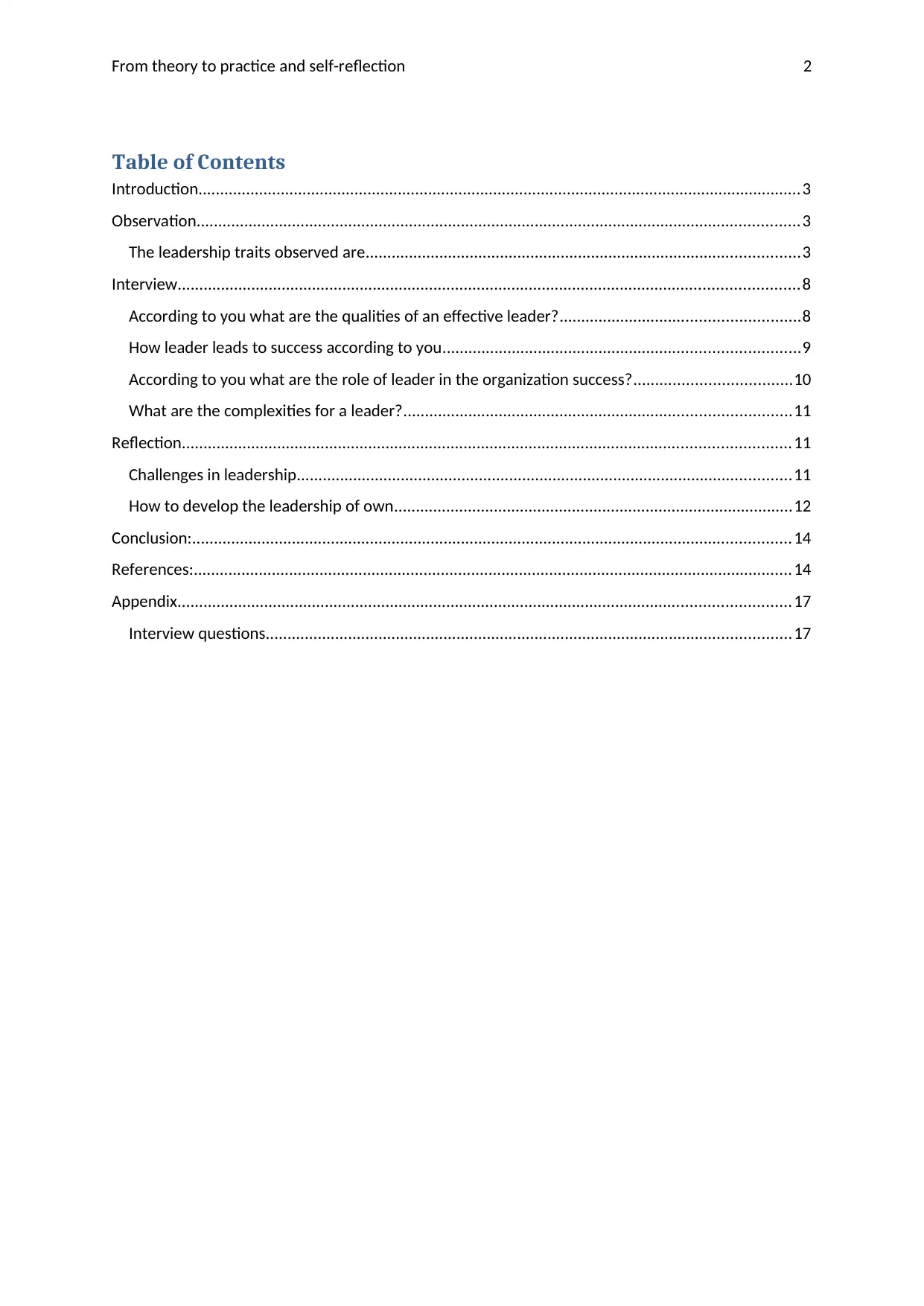
From theory to practice and self-reflection 2
Table of Contents
Introduction...........................................................................................................................................3
Observation...........................................................................................................................................3
The leadership traits observed are....................................................................................................3
Interview...............................................................................................................................................8
According to you what are the qualities of an effective leader?.......................................................8
How leader leads to success according to you..................................................................................9
According to you what are the role of leader in the organization success?....................................10
What are the complexities for a leader?.........................................................................................11
Reflection............................................................................................................................................11
Challenges in leadership..................................................................................................................11
How to develop the leadership of own............................................................................................12
Conclusion:..........................................................................................................................................14
References:..........................................................................................................................................14
Appendix.............................................................................................................................................17
Interview questions.........................................................................................................................17
Table of Contents
Introduction...........................................................................................................................................3
Observation...........................................................................................................................................3
The leadership traits observed are....................................................................................................3
Interview...............................................................................................................................................8
According to you what are the qualities of an effective leader?.......................................................8
How leader leads to success according to you..................................................................................9
According to you what are the role of leader in the organization success?....................................10
What are the complexities for a leader?.........................................................................................11
Reflection............................................................................................................................................11
Challenges in leadership..................................................................................................................11
How to develop the leadership of own............................................................................................12
Conclusion:..........................................................................................................................................14
References:..........................................................................................................................................14
Appendix.............................................................................................................................................17
Interview questions.........................................................................................................................17
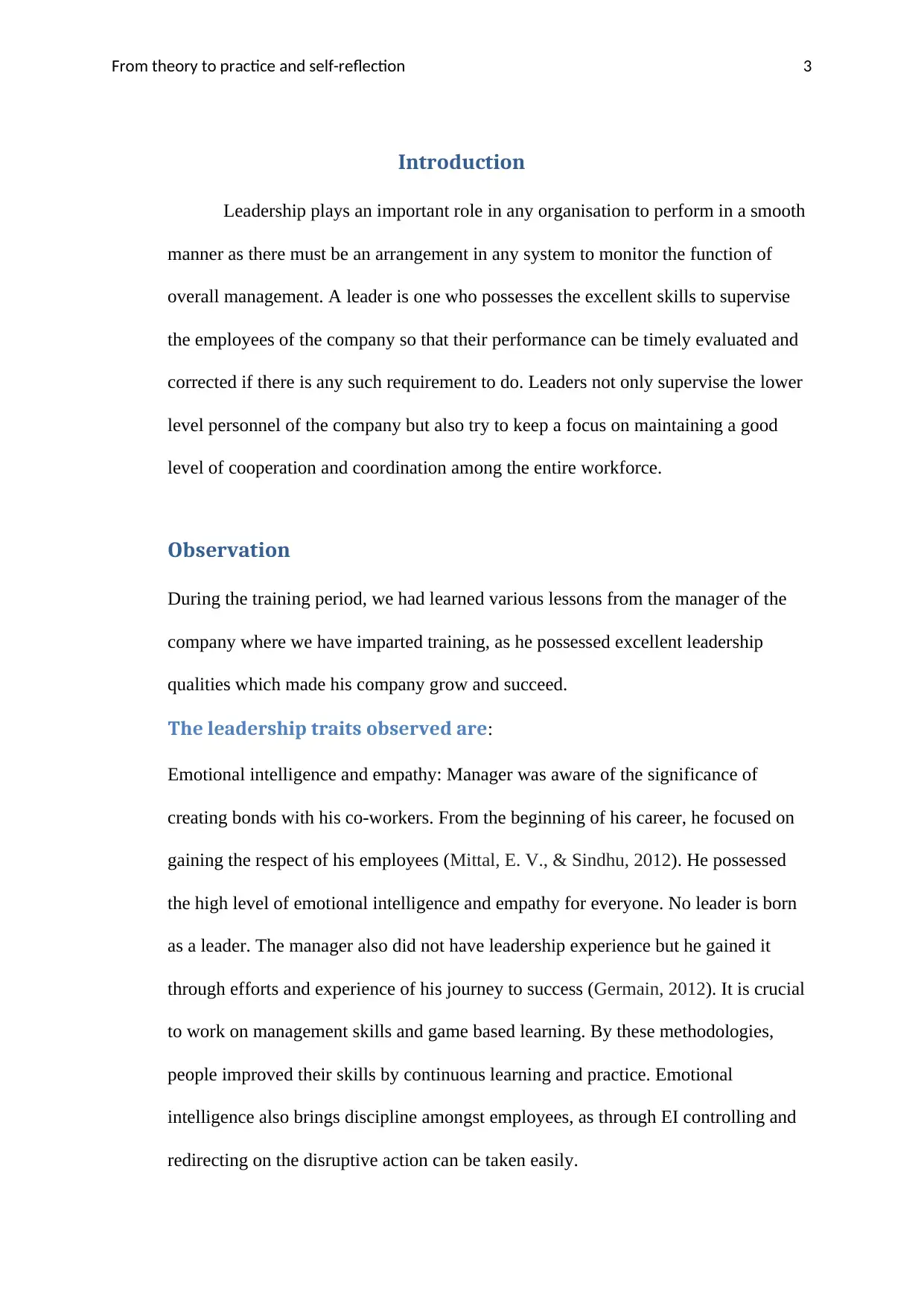
From theory to practice and self-reflection 3
Introduction
Leadership plays an important role in any organisation to perform in a smooth
manner as there must be an arrangement in any system to monitor the function of
overall management. A leader is one who possesses the excellent skills to supervise
the employees of the company so that their performance can be timely evaluated and
corrected if there is any such requirement to do. Leaders not only supervise the lower
level personnel of the company but also try to keep a focus on maintaining a good
level of cooperation and coordination among the entire workforce.
Observation
During the training period, we had learned various lessons from the manager of the
company where we have imparted training, as he possessed excellent leadership
qualities which made his company grow and succeed.
The leadership traits observed are:
Emotional intelligence and empathy: Manager was aware of the significance of
creating bonds with his co-workers. From the beginning of his career, he focused on
gaining the respect of his employees (Mittal, E. V., & Sindhu, 2012). He possessed
the high level of emotional intelligence and empathy for everyone. No leader is born
as a leader. The manager also did not have leadership experience but he gained it
through efforts and experience of his journey to success (Germain, 2012). It is crucial
to work on management skills and game based learning. By these methodologies,
people improved their skills by continuous learning and practice. Emotional
intelligence also brings discipline amongst employees, as through EI controlling and
redirecting on the disruptive action can be taken easily.
Introduction
Leadership plays an important role in any organisation to perform in a smooth
manner as there must be an arrangement in any system to monitor the function of
overall management. A leader is one who possesses the excellent skills to supervise
the employees of the company so that their performance can be timely evaluated and
corrected if there is any such requirement to do. Leaders not only supervise the lower
level personnel of the company but also try to keep a focus on maintaining a good
level of cooperation and coordination among the entire workforce.
Observation
During the training period, we had learned various lessons from the manager of the
company where we have imparted training, as he possessed excellent leadership
qualities which made his company grow and succeed.
The leadership traits observed are:
Emotional intelligence and empathy: Manager was aware of the significance of
creating bonds with his co-workers. From the beginning of his career, he focused on
gaining the respect of his employees (Mittal, E. V., & Sindhu, 2012). He possessed
the high level of emotional intelligence and empathy for everyone. No leader is born
as a leader. The manager also did not have leadership experience but he gained it
through efforts and experience of his journey to success (Germain, 2012). It is crucial
to work on management skills and game based learning. By these methodologies,
people improved their skills by continuous learning and practice. Emotional
intelligence also brings discipline amongst employees, as through EI controlling and
redirecting on the disruptive action can be taken easily.
⊘ This is a preview!⊘
Do you want full access?
Subscribe today to unlock all pages.

Trusted by 1+ million students worldwide
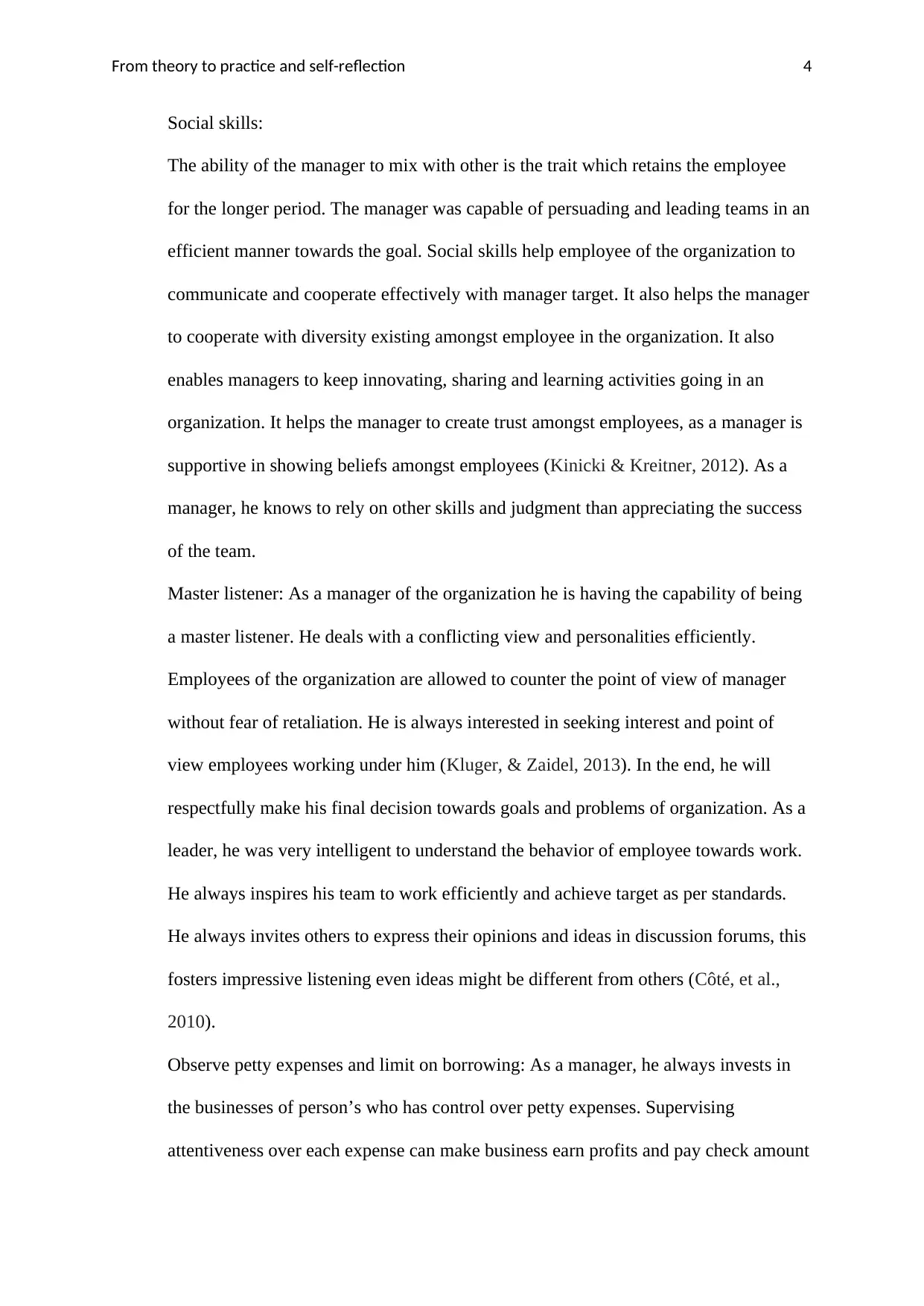
From theory to practice and self-reflection 4
Social skills:
The ability of the manager to mix with other is the trait which retains the employee
for the longer period. The manager was capable of persuading and leading teams in an
efficient manner towards the goal. Social skills help employee of the organization to
communicate and cooperate effectively with manager target. It also helps the manager
to cooperate with diversity existing amongst employee in the organization. It also
enables managers to keep innovating, sharing and learning activities going in an
organization. It helps the manager to create trust amongst employees, as a manager is
supportive in showing beliefs amongst employees (Kinicki & Kreitner, 2012). As a
manager, he knows to rely on other skills and judgment than appreciating the success
of the team.
Master listener: As a manager of the organization he is having the capability of being
a master listener. He deals with a conflicting view and personalities efficiently.
Employees of the organization are allowed to counter the point of view of manager
without fear of retaliation. He is always interested in seeking interest and point of
view employees working under him (Kluger, & Zaidel, 2013). In the end, he will
respectfully make his final decision towards goals and problems of organization. As a
leader, he was very intelligent to understand the behavior of employee towards work.
He always inspires his team to work efficiently and achieve target as per standards.
He always invites others to express their opinions and ideas in discussion forums, this
fosters impressive listening even ideas might be different from others (Côté, et al.,
2010).
Observe petty expenses and limit on borrowing: As a manager, he always invests in
the businesses of person’s who has control over petty expenses. Supervising
attentiveness over each expense can make business earn profits and pay check amount
Social skills:
The ability of the manager to mix with other is the trait which retains the employee
for the longer period. The manager was capable of persuading and leading teams in an
efficient manner towards the goal. Social skills help employee of the organization to
communicate and cooperate effectively with manager target. It also helps the manager
to cooperate with diversity existing amongst employee in the organization. It also
enables managers to keep innovating, sharing and learning activities going in an
organization. It helps the manager to create trust amongst employees, as a manager is
supportive in showing beliefs amongst employees (Kinicki & Kreitner, 2012). As a
manager, he knows to rely on other skills and judgment than appreciating the success
of the team.
Master listener: As a manager of the organization he is having the capability of being
a master listener. He deals with a conflicting view and personalities efficiently.
Employees of the organization are allowed to counter the point of view of manager
without fear of retaliation. He is always interested in seeking interest and point of
view employees working under him (Kluger, & Zaidel, 2013). In the end, he will
respectfully make his final decision towards goals and problems of organization. As a
leader, he was very intelligent to understand the behavior of employee towards work.
He always inspires his team to work efficiently and achieve target as per standards.
He always invites others to express their opinions and ideas in discussion forums, this
fosters impressive listening even ideas might be different from others (Côté, et al.,
2010).
Observe petty expenses and limit on borrowing: As a manager, he always invests in
the businesses of person’s who has control over petty expenses. Supervising
attentiveness over each expense can make business earn profits and pay check amount
Paraphrase This Document
Need a fresh take? Get an instant paraphrase of this document with our AI Paraphraser
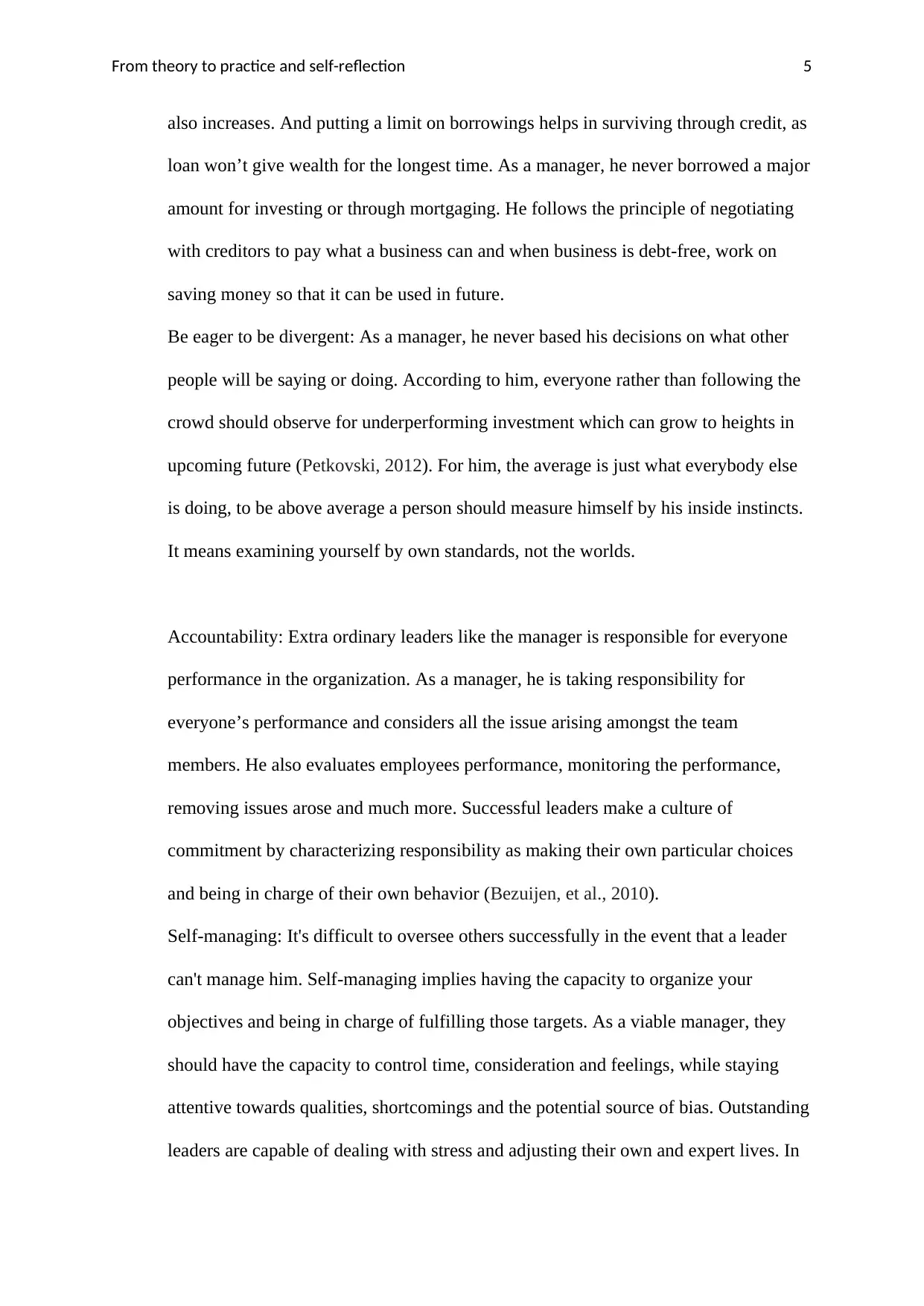
From theory to practice and self-reflection 5
also increases. And putting a limit on borrowings helps in surviving through credit, as
loan won’t give wealth for the longest time. As a manager, he never borrowed a major
amount for investing or through mortgaging. He follows the principle of negotiating
with creditors to pay what a business can and when business is debt-free, work on
saving money so that it can be used in future.
Be eager to be divergent: As a manager, he never based his decisions on what other
people will be saying or doing. According to him, everyone rather than following the
crowd should observe for underperforming investment which can grow to heights in
upcoming future (Petkovski, 2012). For him, the average is just what everybody else
is doing, to be above average a person should measure himself by his inside instincts.
It means examining yourself by own standards, not the worlds.
Accountability: Extra ordinary leaders like the manager is responsible for everyone
performance in the organization. As a manager, he is taking responsibility for
everyone’s performance and considers all the issue arising amongst the team
members. He also evaluates employees performance, monitoring the performance,
removing issues arose and much more. Successful leaders make a culture of
commitment by characterizing responsibility as making their own particular choices
and being in charge of their own behavior (Bezuijen, et al., 2010).
Self-managing: It's difficult to oversee others successfully in the event that a leader
can't manage him. Self-managing implies having the capacity to organize your
objectives and being in charge of fulfilling those targets. As a viable manager, they
should have the capacity to control time, consideration and feelings, while staying
attentive towards qualities, shortcomings and the potential source of bias. Outstanding
leaders are capable of dealing with stress and adjusting their own and expert lives. In
also increases. And putting a limit on borrowings helps in surviving through credit, as
loan won’t give wealth for the longest time. As a manager, he never borrowed a major
amount for investing or through mortgaging. He follows the principle of negotiating
with creditors to pay what a business can and when business is debt-free, work on
saving money so that it can be used in future.
Be eager to be divergent: As a manager, he never based his decisions on what other
people will be saying or doing. According to him, everyone rather than following the
crowd should observe for underperforming investment which can grow to heights in
upcoming future (Petkovski, 2012). For him, the average is just what everybody else
is doing, to be above average a person should measure himself by his inside instincts.
It means examining yourself by own standards, not the worlds.
Accountability: Extra ordinary leaders like the manager is responsible for everyone
performance in the organization. As a manager, he is taking responsibility for
everyone’s performance and considers all the issue arising amongst the team
members. He also evaluates employees performance, monitoring the performance,
removing issues arose and much more. Successful leaders make a culture of
commitment by characterizing responsibility as making their own particular choices
and being in charge of their own behavior (Bezuijen, et al., 2010).
Self-managing: It's difficult to oversee others successfully in the event that a leader
can't manage him. Self-managing implies having the capacity to organize your
objectives and being in charge of fulfilling those targets. As a viable manager, they
should have the capacity to control time, consideration and feelings, while staying
attentive towards qualities, shortcomings and the potential source of bias. Outstanding
leaders are capable of dealing with stress and adjusting their own and expert lives. In
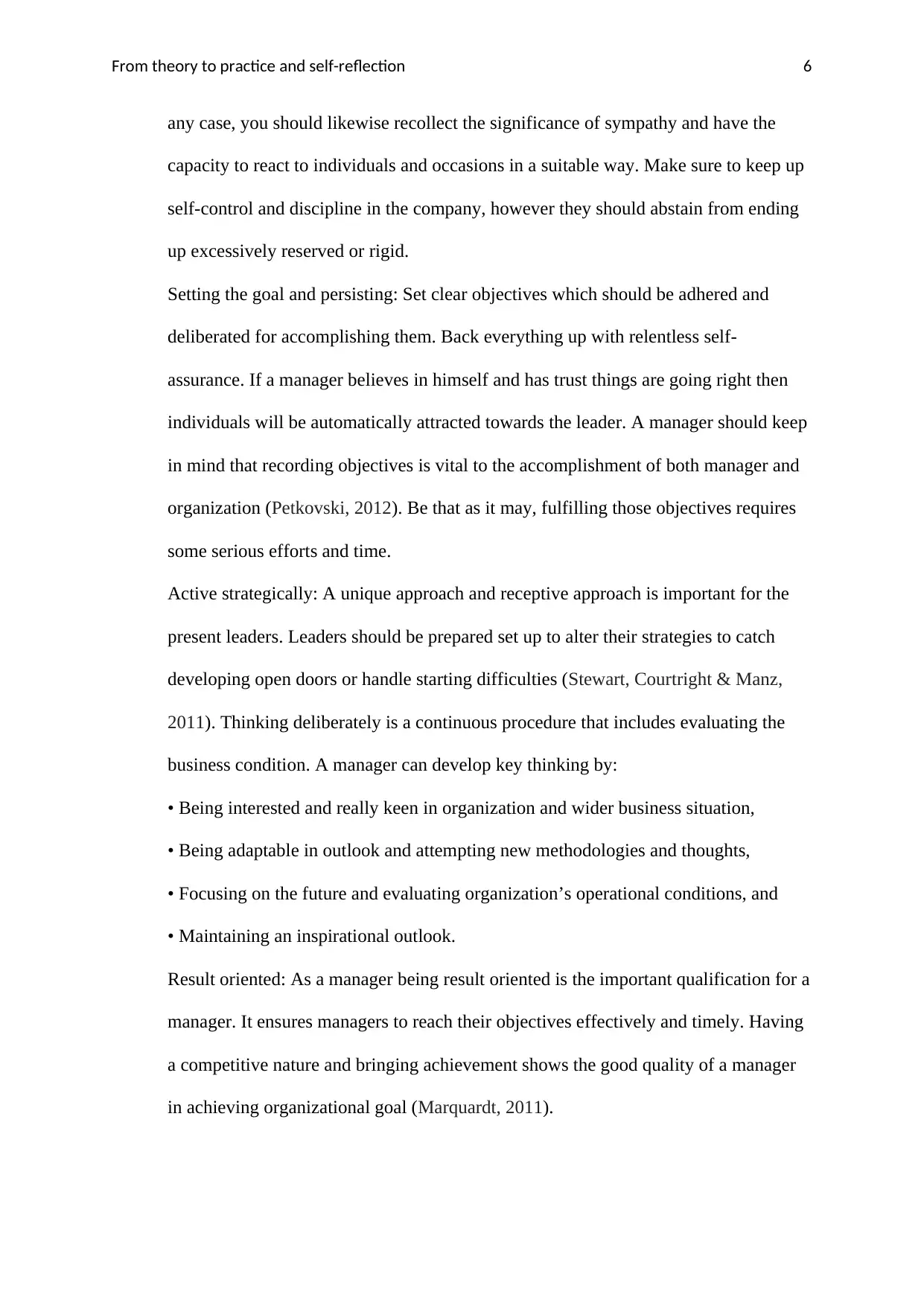
From theory to practice and self-reflection 6
any case, you should likewise recollect the significance of sympathy and have the
capacity to react to individuals and occasions in a suitable way. Make sure to keep up
self-control and discipline in the company, however they should abstain from ending
up excessively reserved or rigid.
Setting the goal and persisting: Set clear objectives which should be adhered and
deliberated for accomplishing them. Back everything up with relentless self-
assurance. If a manager believes in himself and has trust things are going right then
individuals will be automatically attracted towards the leader. A manager should keep
in mind that recording objectives is vital to the accomplishment of both manager and
organization (Petkovski, 2012). Be that as it may, fulfilling those objectives requires
some serious efforts and time.
Active strategically: A unique approach and receptive approach is important for the
present leaders. Leaders should be prepared set up to alter their strategies to catch
developing open doors or handle starting difficulties (Stewart, Courtright & Manz,
2011). Thinking deliberately is a continuous procedure that includes evaluating the
business condition. A manager can develop key thinking by:
• Being interested and really keen in organization and wider business situation,
• Being adaptable in outlook and attempting new methodologies and thoughts,
• Focusing on the future and evaluating organization’s operational conditions, and
• Maintaining an inspirational outlook.
Result oriented: As a manager being result oriented is the important qualification for a
manager. It ensures managers to reach their objectives effectively and timely. Having
a competitive nature and bringing achievement shows the good quality of a manager
in achieving organizational goal (Marquardt, 2011).
any case, you should likewise recollect the significance of sympathy and have the
capacity to react to individuals and occasions in a suitable way. Make sure to keep up
self-control and discipline in the company, however they should abstain from ending
up excessively reserved or rigid.
Setting the goal and persisting: Set clear objectives which should be adhered and
deliberated for accomplishing them. Back everything up with relentless self-
assurance. If a manager believes in himself and has trust things are going right then
individuals will be automatically attracted towards the leader. A manager should keep
in mind that recording objectives is vital to the accomplishment of both manager and
organization (Petkovski, 2012). Be that as it may, fulfilling those objectives requires
some serious efforts and time.
Active strategically: A unique approach and receptive approach is important for the
present leaders. Leaders should be prepared set up to alter their strategies to catch
developing open doors or handle starting difficulties (Stewart, Courtright & Manz,
2011). Thinking deliberately is a continuous procedure that includes evaluating the
business condition. A manager can develop key thinking by:
• Being interested and really keen in organization and wider business situation,
• Being adaptable in outlook and attempting new methodologies and thoughts,
• Focusing on the future and evaluating organization’s operational conditions, and
• Maintaining an inspirational outlook.
Result oriented: As a manager being result oriented is the important qualification for a
manager. It ensures managers to reach their objectives effectively and timely. Having
a competitive nature and bringing achievement shows the good quality of a manager
in achieving organizational goal (Marquardt, 2011).
⊘ This is a preview!⊘
Do you want full access?
Subscribe today to unlock all pages.

Trusted by 1+ million students worldwide
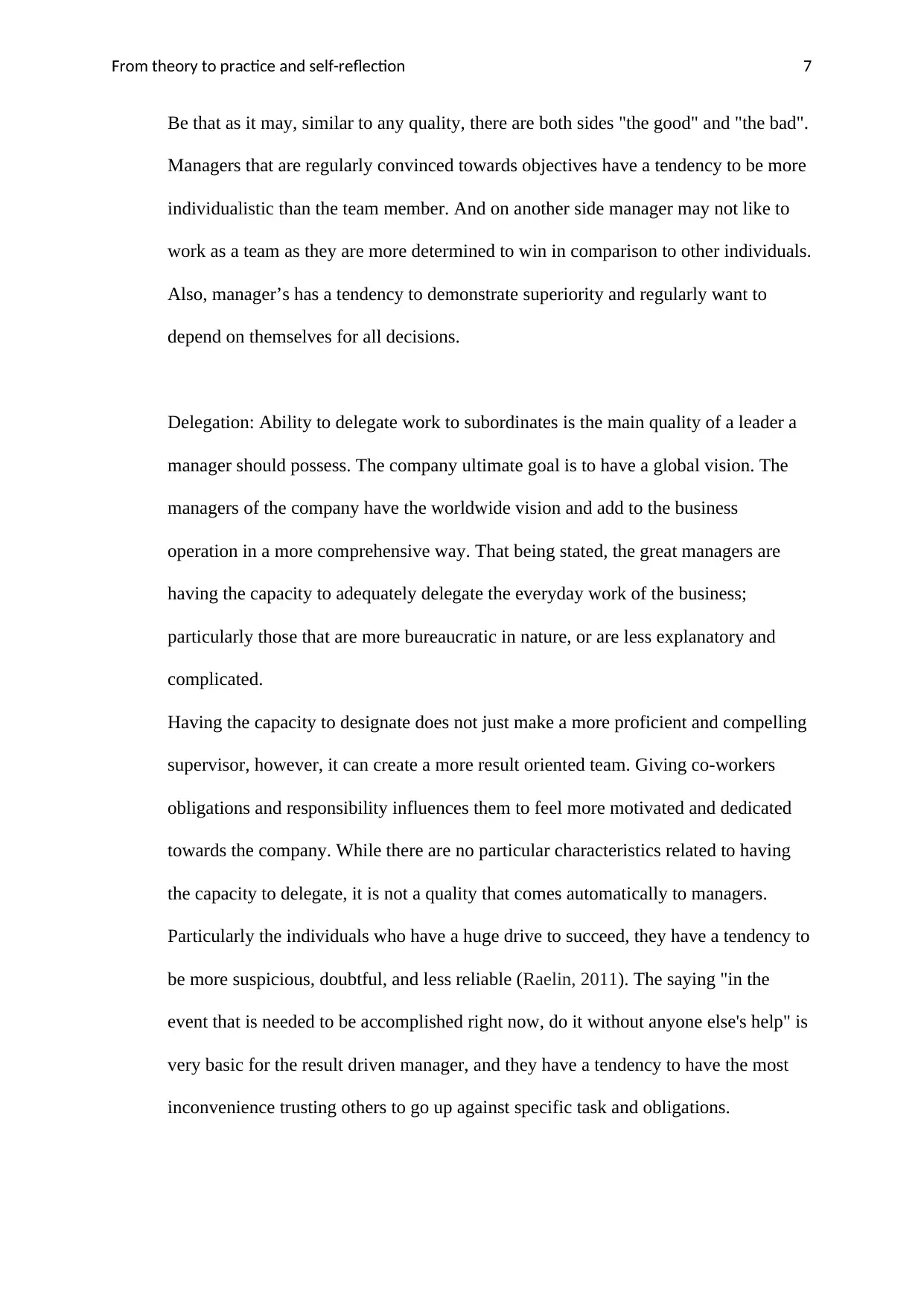
From theory to practice and self-reflection 7
Be that as it may, similar to any quality, there are both sides "the good" and "the bad".
Managers that are regularly convinced towards objectives have a tendency to be more
individualistic than the team member. And on another side manager may not like to
work as a team as they are more determined to win in comparison to other individuals.
Also, manager’s has a tendency to demonstrate superiority and regularly want to
depend on themselves for all decisions.
Delegation: Ability to delegate work to subordinates is the main quality of a leader a
manager should possess. The company ultimate goal is to have a global vision. The
managers of the company have the worldwide vision and add to the business
operation in a more comprehensive way. That being stated, the great managers are
having the capacity to adequately delegate the everyday work of the business;
particularly those that are more bureaucratic in nature, or are less explanatory and
complicated.
Having the capacity to designate does not just make a more proficient and compelling
supervisor, however, it can create a more result oriented team. Giving co-workers
obligations and responsibility influences them to feel more motivated and dedicated
towards the company. While there are no particular characteristics related to having
the capacity to delegate, it is not a quality that comes automatically to managers.
Particularly the individuals who have a huge drive to succeed, they have a tendency to
be more suspicious, doubtful, and less reliable (Raelin, 2011). The saying "in the
event that is needed to be accomplished right now, do it without anyone else's help" is
very basic for the result driven manager, and they have a tendency to have the most
inconvenience trusting others to go up against specific task and obligations.
Be that as it may, similar to any quality, there are both sides "the good" and "the bad".
Managers that are regularly convinced towards objectives have a tendency to be more
individualistic than the team member. And on another side manager may not like to
work as a team as they are more determined to win in comparison to other individuals.
Also, manager’s has a tendency to demonstrate superiority and regularly want to
depend on themselves for all decisions.
Delegation: Ability to delegate work to subordinates is the main quality of a leader a
manager should possess. The company ultimate goal is to have a global vision. The
managers of the company have the worldwide vision and add to the business
operation in a more comprehensive way. That being stated, the great managers are
having the capacity to adequately delegate the everyday work of the business;
particularly those that are more bureaucratic in nature, or are less explanatory and
complicated.
Having the capacity to designate does not just make a more proficient and compelling
supervisor, however, it can create a more result oriented team. Giving co-workers
obligations and responsibility influences them to feel more motivated and dedicated
towards the company. While there are no particular characteristics related to having
the capacity to delegate, it is not a quality that comes automatically to managers.
Particularly the individuals who have a huge drive to succeed, they have a tendency to
be more suspicious, doubtful, and less reliable (Raelin, 2011). The saying "in the
event that is needed to be accomplished right now, do it without anyone else's help" is
very basic for the result driven manager, and they have a tendency to have the most
inconvenience trusting others to go up against specific task and obligations.
Paraphrase This Document
Need a fresh take? Get an instant paraphrase of this document with our AI Paraphraser
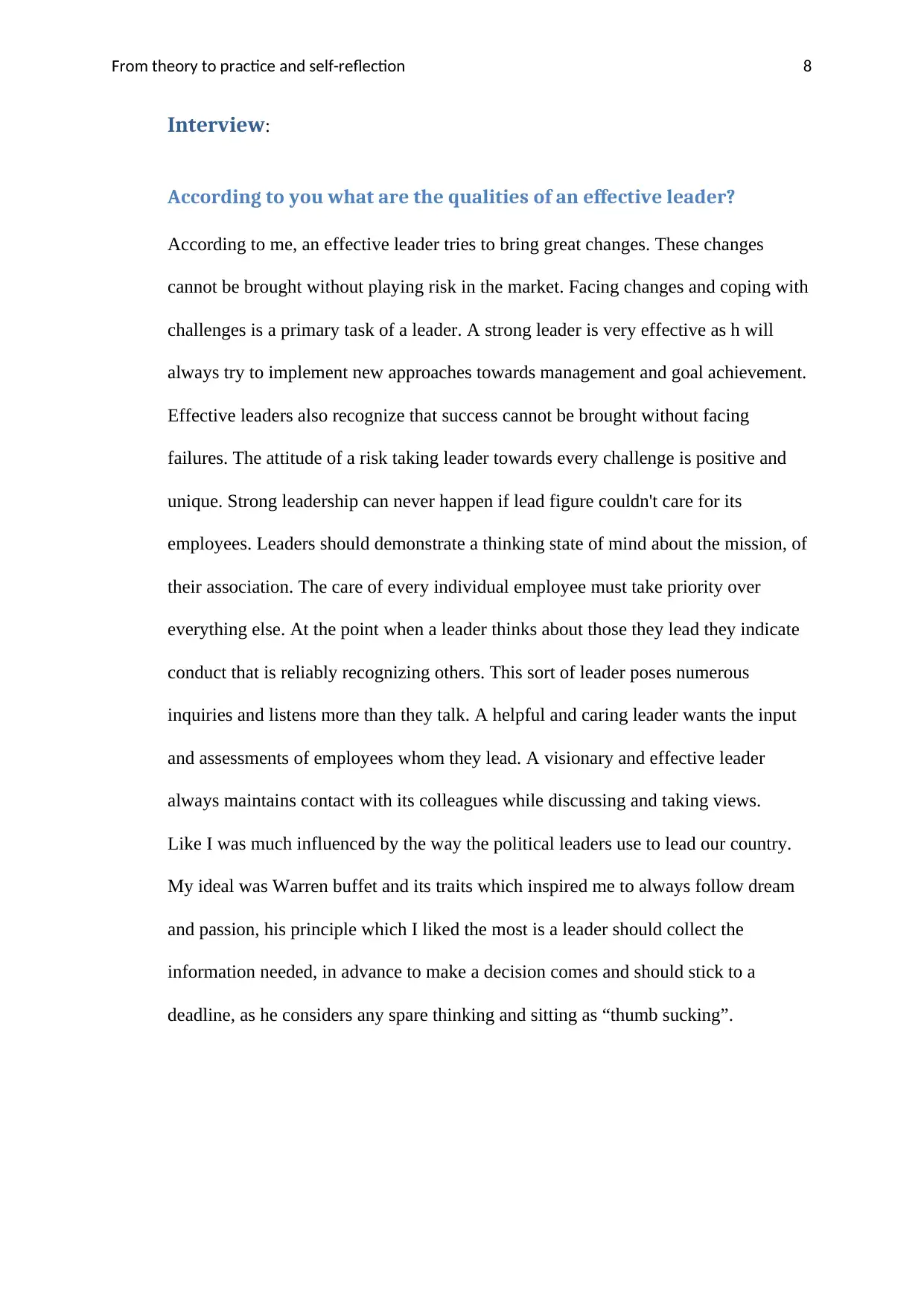
From theory to practice and self-reflection 8
Interview:
According to you what are the qualities of an effective leader?
According to me, an effective leader tries to bring great changes. These changes
cannot be brought without playing risk in the market. Facing changes and coping with
challenges is a primary task of a leader. A strong leader is very effective as h will
always try to implement new approaches towards management and goal achievement.
Effective leaders also recognize that success cannot be brought without facing
failures. The attitude of a risk taking leader towards every challenge is positive and
unique. Strong leadership can never happen if lead figure couldn't care for its
employees. Leaders should demonstrate a thinking state of mind about the mission, of
their association. The care of every individual employee must take priority over
everything else. At the point when a leader thinks about those they lead they indicate
conduct that is reliably recognizing others. This sort of leader poses numerous
inquiries and listens more than they talk. A helpful and caring leader wants the input
and assessments of employees whom they lead. A visionary and effective leader
always maintains contact with its colleagues while discussing and taking views.
Like I was much influenced by the way the political leaders use to lead our country.
My ideal was Warren buffet and its traits which inspired me to always follow dream
and passion, his principle which I liked the most is a leader should collect the
information needed, in advance to make a decision comes and should stick to a
deadline, as he considers any spare thinking and sitting as “thumb sucking”.
Interview:
According to you what are the qualities of an effective leader?
According to me, an effective leader tries to bring great changes. These changes
cannot be brought without playing risk in the market. Facing changes and coping with
challenges is a primary task of a leader. A strong leader is very effective as h will
always try to implement new approaches towards management and goal achievement.
Effective leaders also recognize that success cannot be brought without facing
failures. The attitude of a risk taking leader towards every challenge is positive and
unique. Strong leadership can never happen if lead figure couldn't care for its
employees. Leaders should demonstrate a thinking state of mind about the mission, of
their association. The care of every individual employee must take priority over
everything else. At the point when a leader thinks about those they lead they indicate
conduct that is reliably recognizing others. This sort of leader poses numerous
inquiries and listens more than they talk. A helpful and caring leader wants the input
and assessments of employees whom they lead. A visionary and effective leader
always maintains contact with its colleagues while discussing and taking views.
Like I was much influenced by the way the political leaders use to lead our country.
My ideal was Warren buffet and its traits which inspired me to always follow dream
and passion, his principle which I liked the most is a leader should collect the
information needed, in advance to make a decision comes and should stick to a
deadline, as he considers any spare thinking and sitting as “thumb sucking”.
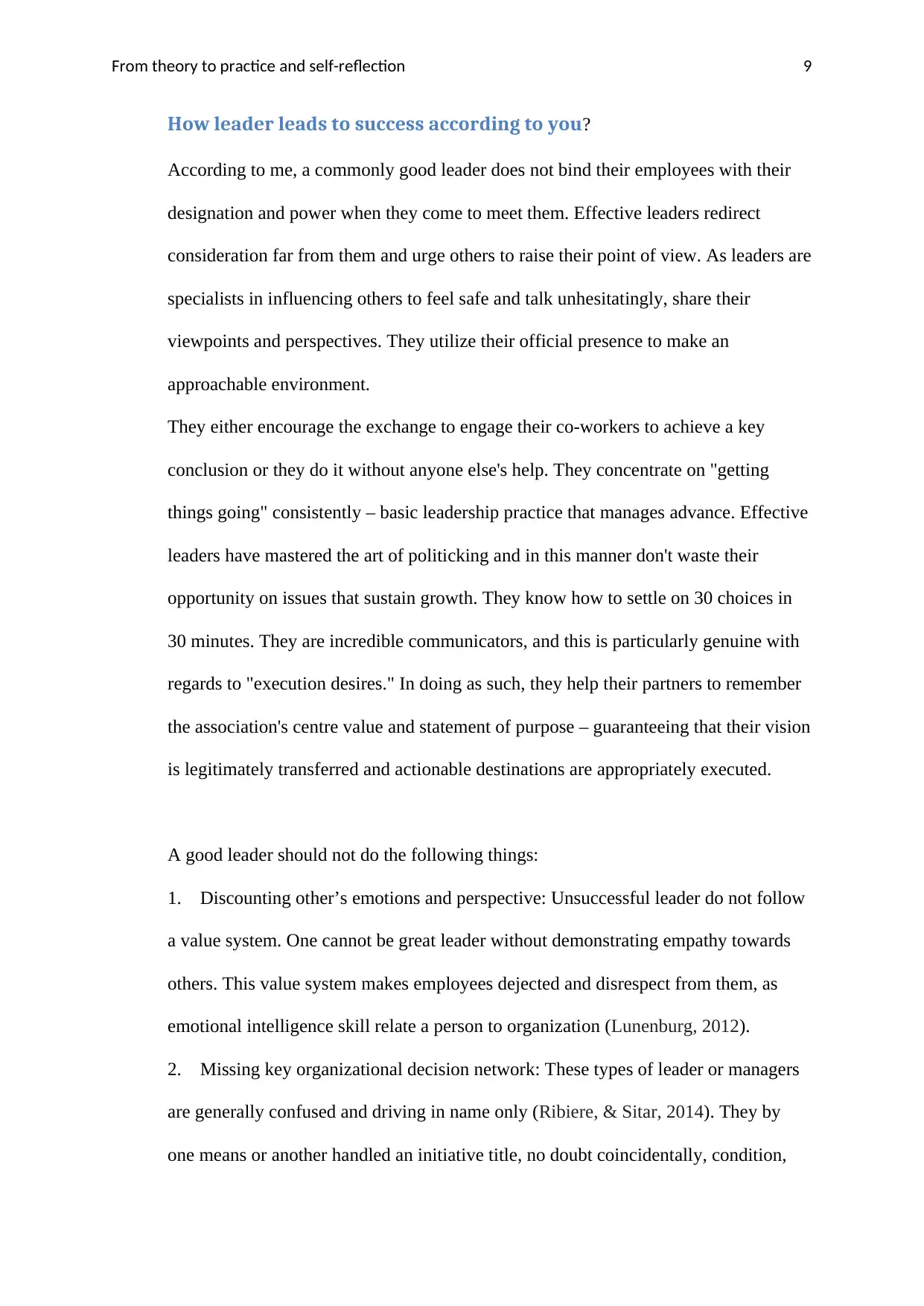
From theory to practice and self-reflection 9
How leader leads to success according to you?
According to me, a commonly good leader does not bind their employees with their
designation and power when they come to meet them. Effective leaders redirect
consideration far from them and urge others to raise their point of view. As leaders are
specialists in influencing others to feel safe and talk unhesitatingly, share their
viewpoints and perspectives. They utilize their official presence to make an
approachable environment.
They either encourage the exchange to engage their co-workers to achieve a key
conclusion or they do it without anyone else's help. They concentrate on "getting
things going" consistently – basic leadership practice that manages advance. Effective
leaders have mastered the art of politicking and in this manner don't waste their
opportunity on issues that sustain growth. They know how to settle on 30 choices in
30 minutes. They are incredible communicators, and this is particularly genuine with
regards to "execution desires." In doing as such, they help their partners to remember
the association's centre value and statement of purpose – guaranteeing that their vision
is legitimately transferred and actionable destinations are appropriately executed.
A good leader should not do the following things:
1. Discounting other’s emotions and perspective: Unsuccessful leader do not follow
a value system. One cannot be great leader without demonstrating empathy towards
others. This value system makes employees dejected and disrespect from them, as
emotional intelligence skill relate a person to organization (Lunenburg, 2012).
2. Missing key organizational decision network: These types of leader or managers
are generally confused and driving in name only (Ribiere, & Sitar, 2014). They by
one means or another handled an initiative title, no doubt coincidentally, condition,
How leader leads to success according to you?
According to me, a commonly good leader does not bind their employees with their
designation and power when they come to meet them. Effective leaders redirect
consideration far from them and urge others to raise their point of view. As leaders are
specialists in influencing others to feel safe and talk unhesitatingly, share their
viewpoints and perspectives. They utilize their official presence to make an
approachable environment.
They either encourage the exchange to engage their co-workers to achieve a key
conclusion or they do it without anyone else's help. They concentrate on "getting
things going" consistently – basic leadership practice that manages advance. Effective
leaders have mastered the art of politicking and in this manner don't waste their
opportunity on issues that sustain growth. They know how to settle on 30 choices in
30 minutes. They are incredible communicators, and this is particularly genuine with
regards to "execution desires." In doing as such, they help their partners to remember
the association's centre value and statement of purpose – guaranteeing that their vision
is legitimately transferred and actionable destinations are appropriately executed.
A good leader should not do the following things:
1. Discounting other’s emotions and perspective: Unsuccessful leader do not follow
a value system. One cannot be great leader without demonstrating empathy towards
others. This value system makes employees dejected and disrespect from them, as
emotional intelligence skill relate a person to organization (Lunenburg, 2012).
2. Missing key organizational decision network: These types of leader or managers
are generally confused and driving in name only (Ribiere, & Sitar, 2014). They by
one means or another handled an initiative title, no doubt coincidentally, condition,
⊘ This is a preview!⊘
Do you want full access?
Subscribe today to unlock all pages.

Trusted by 1+ million students worldwide
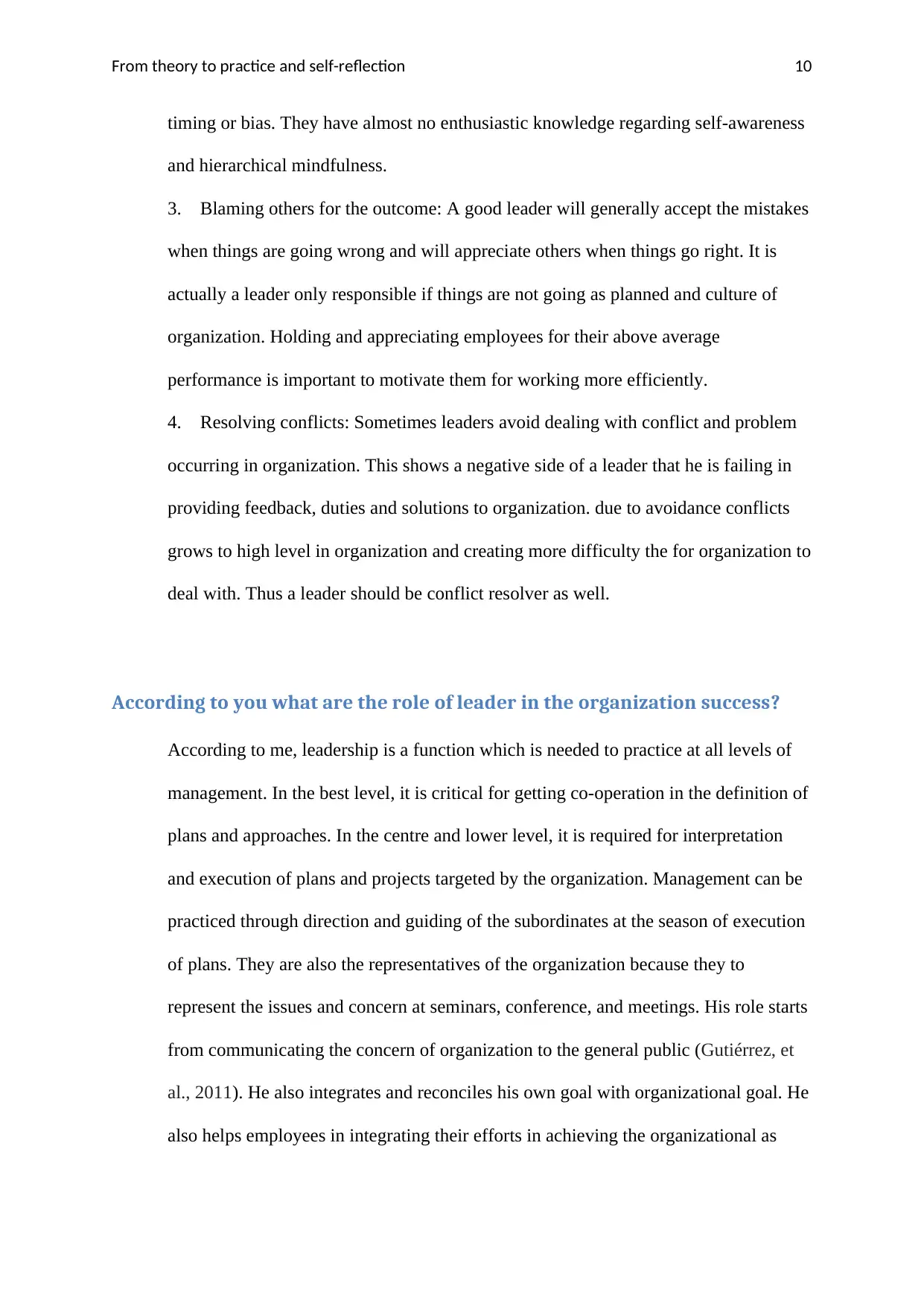
From theory to practice and self-reflection 10
timing or bias. They have almost no enthusiastic knowledge regarding self-awareness
and hierarchical mindfulness.
3. Blaming others for the outcome: A good leader will generally accept the mistakes
when things are going wrong and will appreciate others when things go right. It is
actually a leader only responsible if things are not going as planned and culture of
organization. Holding and appreciating employees for their above average
performance is important to motivate them for working more efficiently.
4. Resolving conflicts: Sometimes leaders avoid dealing with conflict and problem
occurring in organization. This shows a negative side of a leader that he is failing in
providing feedback, duties and solutions to organization. due to avoidance conflicts
grows to high level in organization and creating more difficulty the for organization to
deal with. Thus a leader should be conflict resolver as well.
According to you what are the role of leader in the organization success?
According to me, leadership is a function which is needed to practice at all levels of
management. In the best level, it is critical for getting co-operation in the definition of
plans and approaches. In the centre and lower level, it is required for interpretation
and execution of plans and projects targeted by the organization. Management can be
practiced through direction and guiding of the subordinates at the season of execution
of plans. They are also the representatives of the organization because they to
represent the issues and concern at seminars, conference, and meetings. His role starts
from communicating the concern of organization to the general public (Gutiérrez, et
al., 2011). He also integrates and reconciles his own goal with organizational goal. He
also helps employees in integrating their efforts in achieving the organizational as
timing or bias. They have almost no enthusiastic knowledge regarding self-awareness
and hierarchical mindfulness.
3. Blaming others for the outcome: A good leader will generally accept the mistakes
when things are going wrong and will appreciate others when things go right. It is
actually a leader only responsible if things are not going as planned and culture of
organization. Holding and appreciating employees for their above average
performance is important to motivate them for working more efficiently.
4. Resolving conflicts: Sometimes leaders avoid dealing with conflict and problem
occurring in organization. This shows a negative side of a leader that he is failing in
providing feedback, duties and solutions to organization. due to avoidance conflicts
grows to high level in organization and creating more difficulty the for organization to
deal with. Thus a leader should be conflict resolver as well.
According to you what are the role of leader in the organization success?
According to me, leadership is a function which is needed to practice at all levels of
management. In the best level, it is critical for getting co-operation in the definition of
plans and approaches. In the centre and lower level, it is required for interpretation
and execution of plans and projects targeted by the organization. Management can be
practiced through direction and guiding of the subordinates at the season of execution
of plans. They are also the representatives of the organization because they to
represent the issues and concern at seminars, conference, and meetings. His role starts
from communicating the concern of organization to the general public (Gutiérrez, et
al., 2011). He also integrates and reconciles his own goal with organizational goal. He
also helps employees in integrating their efforts in achieving the organizational as
Paraphrase This Document
Need a fresh take? Get an instant paraphrase of this document with our AI Paraphraser
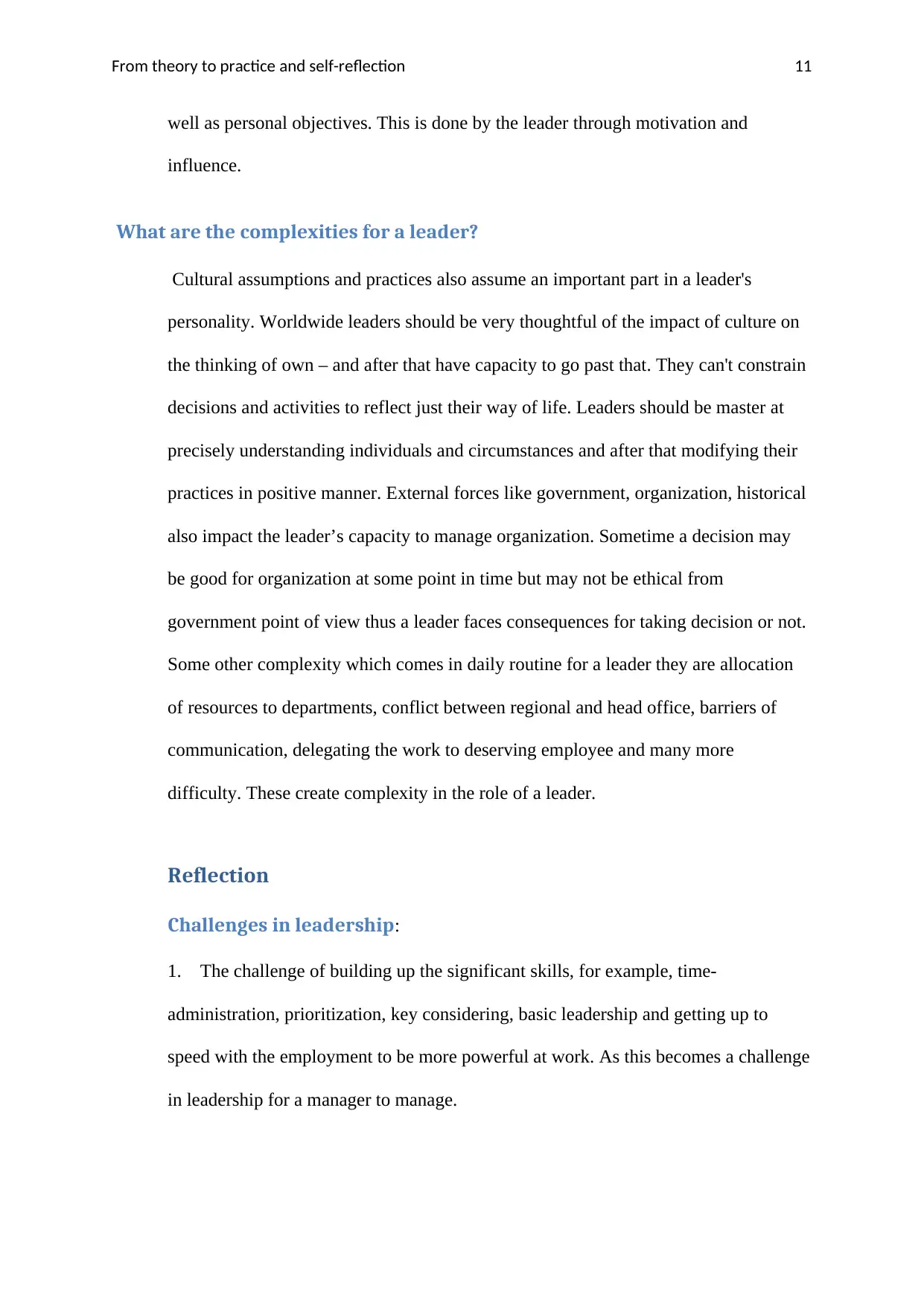
From theory to practice and self-reflection 11
well as personal objectives. This is done by the leader through motivation and
influence.
What are the complexities for a leader?
Cultural assumptions and practices also assume an important part in a leader's
personality. Worldwide leaders should be very thoughtful of the impact of culture on
the thinking of own – and after that have capacity to go past that. They can't constrain
decisions and activities to reflect just their way of life. Leaders should be master at
precisely understanding individuals and circumstances and after that modifying their
practices in positive manner. External forces like government, organization, historical
also impact the leader’s capacity to manage organization. Sometime a decision may
be good for organization at some point in time but may not be ethical from
government point of view thus a leader faces consequences for taking decision or not.
Some other complexity which comes in daily routine for a leader they are allocation
of resources to departments, conflict between regional and head office, barriers of
communication, delegating the work to deserving employee and many more
difficulty. These create complexity in the role of a leader.
Reflection
Challenges in leadership:
1. The challenge of building up the significant skills, for example, time-
administration, prioritization, key considering, basic leadership and getting up to
speed with the employment to be more powerful at work. As this becomes a challenge
in leadership for a manager to manage.
well as personal objectives. This is done by the leader through motivation and
influence.
What are the complexities for a leader?
Cultural assumptions and practices also assume an important part in a leader's
personality. Worldwide leaders should be very thoughtful of the impact of culture on
the thinking of own – and after that have capacity to go past that. They can't constrain
decisions and activities to reflect just their way of life. Leaders should be master at
precisely understanding individuals and circumstances and after that modifying their
practices in positive manner. External forces like government, organization, historical
also impact the leader’s capacity to manage organization. Sometime a decision may
be good for organization at some point in time but may not be ethical from
government point of view thus a leader faces consequences for taking decision or not.
Some other complexity which comes in daily routine for a leader they are allocation
of resources to departments, conflict between regional and head office, barriers of
communication, delegating the work to deserving employee and many more
difficulty. These create complexity in the role of a leader.
Reflection
Challenges in leadership:
1. The challenge of building up the significant skills, for example, time-
administration, prioritization, key considering, basic leadership and getting up to
speed with the employment to be more powerful at work. As this becomes a challenge
in leadership for a manager to manage.
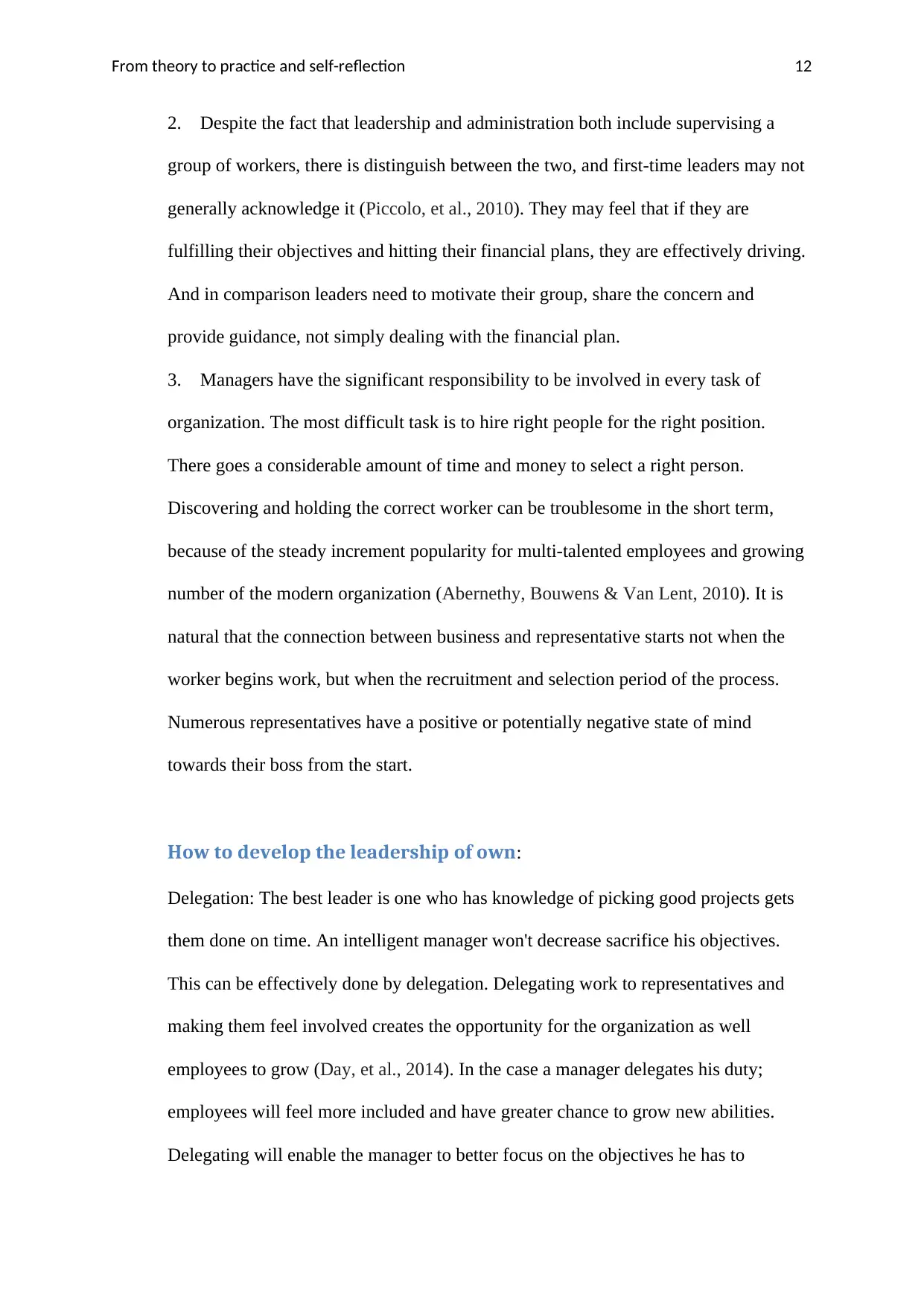
From theory to practice and self-reflection 12
2. Despite the fact that leadership and administration both include supervising a
group of workers, there is distinguish between the two, and first-time leaders may not
generally acknowledge it (Piccolo, et al., 2010). They may feel that if they are
fulfilling their objectives and hitting their financial plans, they are effectively driving.
And in comparison leaders need to motivate their group, share the concern and
provide guidance, not simply dealing with the financial plan.
3. Managers have the significant responsibility to be involved in every task of
organization. The most difficult task is to hire right people for the right position.
There goes a considerable amount of time and money to select a right person.
Discovering and holding the correct worker can be troublesome in the short term,
because of the steady increment popularity for multi-talented employees and growing
number of the modern organization (Abernethy, Bouwens & Van Lent, 2010). It is
natural that the connection between business and representative starts not when the
worker begins work, but when the recruitment and selection period of the process.
Numerous representatives have a positive or potentially negative state of mind
towards their boss from the start.
How to develop the leadership of own:
Delegation: The best leader is one who has knowledge of picking good projects gets
them done on time. An intelligent manager won't decrease sacrifice his objectives.
This can be effectively done by delegation. Delegating work to representatives and
making them feel involved creates the opportunity for the organization as well
employees to grow (Day, et al., 2014). In the case a manager delegates his duty;
employees will feel more included and have greater chance to grow new abilities.
Delegating will enable the manager to better focus on the objectives he has to
2. Despite the fact that leadership and administration both include supervising a
group of workers, there is distinguish between the two, and first-time leaders may not
generally acknowledge it (Piccolo, et al., 2010). They may feel that if they are
fulfilling their objectives and hitting their financial plans, they are effectively driving.
And in comparison leaders need to motivate their group, share the concern and
provide guidance, not simply dealing with the financial plan.
3. Managers have the significant responsibility to be involved in every task of
organization. The most difficult task is to hire right people for the right position.
There goes a considerable amount of time and money to select a right person.
Discovering and holding the correct worker can be troublesome in the short term,
because of the steady increment popularity for multi-talented employees and growing
number of the modern organization (Abernethy, Bouwens & Van Lent, 2010). It is
natural that the connection between business and representative starts not when the
worker begins work, but when the recruitment and selection period of the process.
Numerous representatives have a positive or potentially negative state of mind
towards their boss from the start.
How to develop the leadership of own:
Delegation: The best leader is one who has knowledge of picking good projects gets
them done on time. An intelligent manager won't decrease sacrifice his objectives.
This can be effectively done by delegation. Delegating work to representatives and
making them feel involved creates the opportunity for the organization as well
employees to grow (Day, et al., 2014). In the case a manager delegates his duty;
employees will feel more included and have greater chance to grow new abilities.
Delegating will enable the manager to better focus on the objectives he has to
⊘ This is a preview!⊘
Do you want full access?
Subscribe today to unlock all pages.

Trusted by 1+ million students worldwide
1 out of 18
Related Documents
Your All-in-One AI-Powered Toolkit for Academic Success.
+13062052269
info@desklib.com
Available 24*7 on WhatsApp / Email
![[object Object]](/_next/static/media/star-bottom.7253800d.svg)
Unlock your academic potential
Copyright © 2020–2026 A2Z Services. All Rights Reserved. Developed and managed by ZUCOL.





